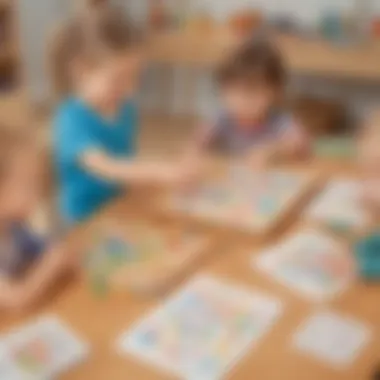Unlocking the Wonders of Early Math Learning for Preschoolers


Science Fun Facts
Preschool math introduces children to the world of numbers, shapes, and patterns, laying a crucial foundation for their academic journey. Counting helps children understand quantity and develop problem-solving skills. Exploring shapes enhances spatial awareness and visualization abilities, while recognizing patterns nurtures cognitive development. Understanding these basic math concepts at an early age sets the stage for future learning and critical thinking skills. 🧮
Preschoolers engaging with math concepts early on experience improved performance in mathematics throughout their academic life. By integrating fun activities, games, and everyday experiences, children can embrace math naturally and develop a positive attitude towards problem-solving. Utilizing interactive methods tailored to young learners' needs fosters an environment where children feel confident and excited to explore the world of numbers and patterns around them.
Discover the Wonders of Math
Introducing preschoolers to math expands their cognitive abilities, promoting logical thinking and problem-solving skills from a young age. Recognizing numbers and their relationships helps children understand the world around them and make sense of quantities. Exploring math through play-based activities not only enhances academic readiness but also nurtures creativity and critical thinking skills.
Interactive tools such as math games, puzzles, and educational videos create an engaging learning experience for preschoolers. By combining visual aids and hands-on activities, children can grasp mathematical concepts more effectively and retain knowledge for longer durations. Real-life applications of math in everyday scenarios demonstrate the practical relevance of numerical understanding, ensuring that children can identify math in their surroundings and apply it to solve daily problems.
Math Quiz Time
Engaging preschoolers in math quizzes and brain teasers helps reinforce learning and retention of mathematical concepts. Multiple-choice questions and interactive challenges stimulate cognition and encourage children to think critically and analytically. By incorporating fun and gamified elements into math quizzes, kids can enjoy the learning process while enhancing their numerical skills.
Math quizzes also provide a platform for parents and caregivers to assess their child's math comprehension and track progress in different mathematical areas. By actively involving children in quiz sessions and encouraging friendly competition, parents can support their child's learning journey and motivate them to explore math further.
Math Experiment Showcase
Conducting hands-on math experiments enables preschoolers to understand mathematical concepts through practical applications. By following step-by-step instructions and using everyday materials, children can visualize abstract math ideas and gain a deeper understanding of numerical relationships. Safety tips and precautions ensure that children can explore math experiments in a secure and monitored environment.
Math experiments showcase the fun and dynamic aspects of math, showcasing how mathematical concepts manifest in the real world. Through engaging experiments that challenge children to think critically and problem-solve, preschoolers can develop a curiosity for math and enhance their spatial reasoning and logical thinking skills. Encouraging exploration and discovery through math experiments nurtures a love for learning and mathematical inquiry from a young age.
Introduction to Math for Preschoolers
Mathematical education for preschoolers is a critical cornerstone in shaping their cognitive development and preparing them for future academic endeavors. The early exposure to mathematical concepts sets a strong foundation for children, fostering essential skills that are invaluable as they progress through their educational journey. By introducing math in their formative years, preschoolers get to acclimate to numerical reasoning and problem-solving from a young age, nurturing a sound mathematical mindset. The inclusion of math at this stage goes beyond mere number manipulation; it cultivates logical thinking, analytical skills, and the ability to make sense of patterns and relationships. Therefore, the paramount significance of integrating math education early cannot be overstated.
Importance of Early Math Education
Building Blocks for Academic Achievement
Early math education serves as the fundamental building block for future academic success. By laying a robust mathematical foundation at a young age, children develop vital skills that will support their scholastic endeavors. Learning basic numerical concepts and problem-solving techniques in the early years primes children for more complex mathematical challenges later on. The structured approach to math education at a preschool level enhances cognitive abilities, such as critical thinking, spatial awareness, and logical reasoning. Moreover, early exposure to math instills confidence in children, empowering them to tackle academic tasks with a positive outlook and a problem-solving mindset.


Enhancing Problem-Solving Abilities
Enhancing problem-solving abilities through math education equips children with a valuable set of skills that transcend the realm of mathematics. By engaging in mathematical problems and puzzles, children develop resilience, perseverance, and strategic thinking. The process of solving math problems encourages children to think creatively, explore different solutions, and learn from their mistakes. This iterative approach to problem-solving fosters a growth mindset, where challenges are viewed as opportunities for learning and growth. Additionally, developing strong problem-solving skills early on paves the way for future academic and professional success, instilling a sense of adaptability and resourcefulness in children.
Developing Numeracy Skills
Understanding Numbers
Understanding numbers is a fundamental aspect of early math education for preschoolers. This foundational skill lays the groundwork for all mathematical concepts that children will encounter in their educational journey. By grasping the concept of numbers, preschoolers develop a sense of quantity, order, and magnitude, enabling them to make sense of the world mathematically. The ability to understand numbers not only enhances mathematical proficiency but also reinforces cognitive skills, such as memory, attention to detail, and logical reasoning. The early exposure to numbers fosters a sense of numerical fluency, empowering children to navigate mathematical challenges with ease and confidence.
Learning to Count
Learning to count is a pivotal skill in the mathematical development of preschoolers. Counting goes beyond reciting numbers; it involves understanding the relationship between numbers, quantity, and ordinality. By engaging in counting activities, children not only enhance their numeracy skills but also sharpen their problem-solving abilities. The process of counting teaches children to quantify objects, comprehend numerical values, and manipulate numbers in a meaningful way. Moreover, counting activities promote concentration, patience, and attention to detail, essential skills that are transferrable to various academic disciplines.
Engagement Through Playful Learning
Utilizing Games and Activities
Engagement through playful learning is a hallmark of effective math education for preschoolers. By incorporating games and activities into math lessons, children are encouraged to explore mathematical concepts in a fun and interactive manner. Games not only make learning enjoyable but also provide a hands-on approach to understanding abstract math principles. Through games, children develop critical thinking skills, strategic planning, and spatial awareness, all while having fun and engaging with mathematical concepts in a meaningful way. The interactive nature of games fosters collaborative learning, creativity, and a positive attitude towards math, making it a vital component of early math education.
Incorporating Math into Daily Life
Incorporating math into daily life routines is an effective way to extend math learning beyond the classroom for preschoolers. By integrating math into everyday activities, such as cooking, shopping, or playing games, children get to see the practical applications of mathematical concepts in real-life scenarios. This hands-on approach enhances problem-solving skills, critical thinking, and numeracy proficiency in children, bridging the gap between theoretical math concepts and practical use. Moreover, incorporating math into daily life encourages children to develop a curiosity for numbers, patterns, and relationships in their environment, fostering a natural inclination towards mathematical exploration and discovery.
Essential Math Concepts for preschoolers
Math concepts for preschoolers play a crucial role in laying the groundwork for their future academic success. By introducing preschoolers to fundamental mathematical principles at an early age, we are nurturing their cognitive development and numeracy skills. Understanding and mastering these basic math concepts forms the building blocks for more complex mathematical concepts they will encounter as they progress through their education. Additionally, early exposure to math helps children develop critical thinking and problem-solving abilities, setting them up for success in various academic disciplines.
Counting Skills
In the realm of counting skills, one vital aspect is 'One-to-One Correspondence.' This concept involves matching each object in a set to a single number, ensuring an accurate count. The ability to establish this direct correspondence between objects and numbers is foundational in developing a strong number sense and arithmetic proficiency. Utilizing hands-on activities and visual aids to reinforce this concept can greatly enhance a child's numerical understanding.
'Humber Recognition' is another significant aspect of counting skills. It involves identifying numbers, associating them with their quantities, and comprehending their sequential order. Proficiency in number recognition is key to performing mathematical operations and lays the groundwork for more advanced math concepts. Encouraging children to practice number recognition through games and everyday interactions can boost their mathematical fluency and confidence.


Shapes and Patterns
Leveling up from counting skills, understanding shapes and patterns introduces preschoolers to the world of geometry and spatial awareness. 'Identifying Basic Shapes' is a critical skill that helps children differentiate between various geometric figures like circles, squares, triangles, and rectangles. This skill fosters visual discrimination and lays the foundation for geometrical comprehension in later education.
Next, 'Recognizing and Creating Patterns' introduces preschoolers to the concept of sequences and regularity. Recognizing patterns helps children predict outcomes, develop logical thinking, and understand mathematical relationships. Encouraging children to create their patterns through art and play can enhance their pattern recognition abilities and stimulate their creativity.
Measurement and Comparison
Beyond shapes and patterns, preschoolers explore 'Measurement and Comparison' as they begin to discern size, length, and quantity relations. 'Understanding Size and Length' introduces children to fundamental measurement concepts, allowing them to compare objects based on their dimensions. This skill lays the groundwork for more advanced measurement concepts like volume and weight.
In tandem, 'Comparing Quantities' sharpens children's ability to evaluate and contrast different amounts. This skill introduces the concept of more, less, and equal, nurturing children's understanding of numerical relationships. Engaging children in measurement-focused activities and games can make learning about quantities interactive and enjoyable.
Basic Addition and Subtraction
Lastly, 'Basic Addition and Subtraction' introduces preschoolers to fundamental arithmetic operations. 'Introduction to Adding' familiarizes children with combining objects or numbers to find a total. This skill develops children's understanding of addition as a form of counting and introduces them to the concept of sum.
On the flip side, the 'Concept of Taking Away' presents subtraction as the process of removing objects or quantities from a total. This skill helps children comprehend subtraction as the opposite of addition and teaches them the concept of difference. Integrating hands-on activities and visual aids into teaching basic addition and subtraction can make learning engaging and help children grasp arithmetic concepts effectively.
When delving into the world of basic math concepts for preschoolers, one cannot underestimate the significance of laying a strong foundation. These formative years play a pivotal role in shaping a child's cognitive development and setting the stage for future academic achievements. Understanding essential math concepts suited for the young minds of preschoolers is not just about numbers and shapes; it is about instilling a love for learning and problem-solving from an early age.
Interactive Learning Approaches
In this article, the focus shifts towards the interactive learning approaches tailored for preschoolers. These approaches transcend traditional teaching methods, offering a dynamic and engaging way for young learners to absorb mathematical concepts effortlessly. The inclusion of interactive learning approaches is crucial in fostering a nurturing environment where children can explore, experiment, and learn through hands-on experiences.
Hands-On Activities
Math Manipulatives
Math manipulatives serve as tangible tools that bridge the gap between abstract mathematical concepts and real-world applications. These hands-on resources provide children with a physical representation of mathematical ideas, allowing them to manipulate objects to understand and solve problems. The tactile nature of math manipulatives facilitates sensory learning, making complex concepts more accessible and engaging for preschoolers. Despite being a popular choice for early math education, math manipulatives also introduce challenges such as storage and organization.
Interactive Math Games
Interactive math games introduce an element of fun and excitement into the learning process. By gamifying mathematical concepts, these games not only entertain but also educate young learners. The competitive nature of interactive math games motivates children to practice and apply their numeracy skills in a playful setting. While interactive math games enhance engagement and retention, monitoring screen time and ensuring educational value are essential considerations for incorporating them into preschool math education.


Visual Tools and Resources
Visual aids play a vital role in reinforcing mathematical understanding and stimulating visual-spatial intelligence in preschoolers. Charts and graphs provide a visual representation of numerical data, making abstract concepts more concrete and approachable. The visual appeal of charts and graphs can aid in memory retention and conceptual clarity, serving as valuable tools for teaching and learning.
Charts and Graphs
Charts and graphs offer a visual scaffold for preschoolers to comprehend numerical relationships and patterns. The visual nature of these tools simplifies complex information, enabling children to interpret data and draw conclusions with ease. While charts and graphs facilitate visual learning and analytical thinking, educators must ensure that the visual representations are age-appropriate, clear, and aligned with learning objectives.
Math Storybooks
Math storybooks combine storytelling with mathematical concepts, creating a multidimensional learning experience for young readers. These narrative-driven resources make math literacy more accessible and engaging, weaving numbers and problem-solving into captivating stories. The narrative structure of math storybooks not only fosters a love for reading but also enhances numerical fluency and critical thinking skills in preschoolers. However, selecting math storybooks that align with curriculum standards and cater to diverse learning styles is imperative for maximizing their educational impact.
Parental Involvement and Support
Parental involvement and support play a pivotal role in the early mathematical development of preschoolers. By actively engaging in their child's mathematical journey, parents and caregivers create a nurturing environment that fosters a love for numbers and problem-solving. Collaborating with educators and incorporating math into daily interactions can significantly impact a child's numeracy skills. Understanding the importance of parental involvement sets the foundation for a child's future academic success.
Encouraging Math Exploration
Creating A Math-Friendly Environment
Creating a math-friendly environment within the home or educational setting involves establishing a space where math is integrated into everyday activities. This approach aims to make math learning enjoyable and accessible for children. By incorporating math-related toys, books, and interactive tools, children naturally engage with mathematical concepts in a non-intimidating way. This immersive environment enhances a child's comfort with numbers and promotes a positive attitude towards math.
Celebrating Math Achievements
Celebrating math achievements is a motivational strategy that acknowledges and reinforces a child's progress and success in mathematics. By recognizing and celebrating milestones, whether big or small, children feel encouraged to continue their mathematical exploration. This positive reinforcement instills confidence and a sense of accomplishment, fueling a child's passion for learning math. Celebrations can range from simple praises to small rewards, creating a supportive and uplifting atmosphere around math education.
Effective Communication Strategies
Discussion Math Concepts
Discussing math concepts with preschoolers involves simplifying complex ideas into digestible pieces of information. Effective communication helps build a strong foundation for mathematical understanding. By engaging in meaningful conversations about numbers, shapes, and patterns, parents and caregivers can support children's cognitive development. Encouraging questions and exploratory thinking cultivates a child's curiosity and critical thinking skills, laying a groundwork for future mathematical advancement.
Offering Encouragement
Offering encouragement during a child's math learning journey is essential for building resilience and a growth mindset. Positive reinforcement and genuine praise motivate children to tackle challenging math tasks with confidence. By highlighting effort and progress, rather than focusing solely on correct answers, parents and caregivers cultivate a positive attitude towards learning. Encouragement fosters perseverance and determination, essential qualities for mastering math concepts and problem-solving skills.







